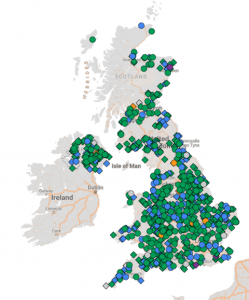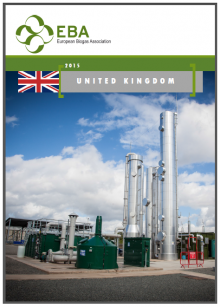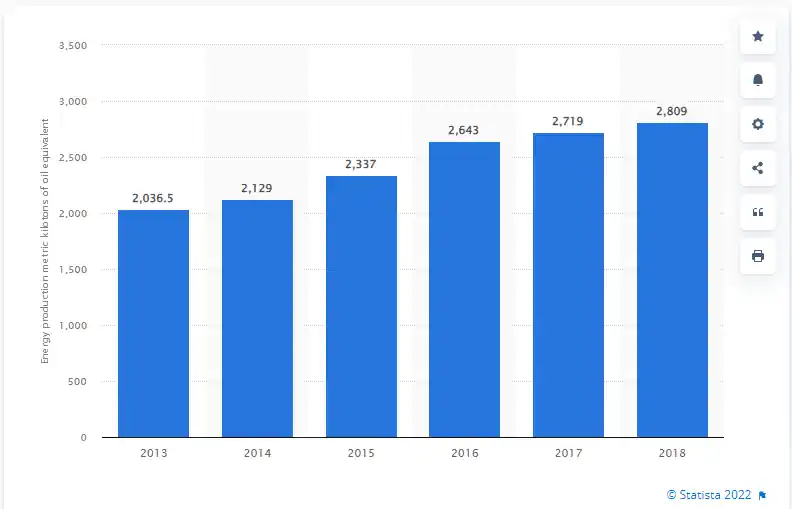Biogas technology in the UK (Biogas UK) is being developed as a renewable energy source that does not entail combustion, resulting in minimal greenhouse gas emissions. Biogas can also help to reduce the amount of waste dumped annually in landfills. Reducing this benefits the environment. Aside from that, the released gas can be captured and converted into liquid fuel for use in heating and power systems. As a result, the stored electricity can be used to power ground source heat pumps, another energy-efficient alternative to air conditioners and furnaces. UK Biogas technology is some of the most sustainable so far devised by man.
Anaerobic Digestion in the UK
In the United Kingdom in 2019/20, there were 579 operational plants with a total installed capacity of 466 MWe. The majority (418) were farm fed (total installed capacity 222 MWe), with the remainder being waste fed. During this time, 331 additional AD projects were in the works, with a total proposed installed capacity of 269 MWe. 228 of these were farm fed (total installed capacity 118 MWe), with the rest being waste industry fed.
Aside from those, the UK water industry has 146 biogas plants installed at wastewater treatment sites throughout the country, which use 1.6 million tonnes of sludge. In terms of feedstock, the UK now has the second-largest share of sewage sludge after Sweden (6 million tonnes). The 75 landfill-based biogas plants bring the total number of plants in the UK to 378, with installed capacities totalling 1,402 MWel. Source: European Biogas Association

More information on planned AD facilities can be found in the NNFCC's annual ‘Anaerobic Digestion in the UK' report, which can be accessed at www.biogas-info.co.uk.
According to the Anaerobic Digestion and Bioresources Association, the first UK biogas plant growth peaked in 2016 with the construction of 33 new plants. (See Chart below.)
In 2020, a Biocow-owned dairy farm in Somerset became the first to connect its biogas production directly to the national transmission system.
Biogas Map | Anaerobic Digestion
 There is an Official Biogas Map that shows all active anaerobic digestion plants in the United Kingdom (excluding water treatment facilities). To view the map in a new window, visit the Biogas Map.
There is an Official Biogas Map that shows all active anaerobic digestion plants in the United Kingdom (excluding water treatment facilities). To view the map in a new window, visit the Biogas Map.
The NNFCC created this map for informational purposes only, and while every effort has been made to ensure the accuracy of the information, the NNFCC cannot be held liable for any errors contained herein.
To have a digester added to the map or to update information on an existing facility, you may fill out their map request form and they will take it into consideration.
UK Biomethane Production
According to the American Biogas Council, the US has over 2,200 operational sites producing biogas in all 50 states – 250 anaerobic digesters on farms; 1,269 water resource recovery facilities using an anaerobic digester; 66 stand-alone systems that digest food waste; and 652 landfill gas projects.
According to WRAP, the UK household, hospitality and food service, food manufacturing, retail, and wholesale sectors generate approximately 10 million tonnes of food waste per year. If all of this was treated using anaerobic digestion, the industry could generate 11 TWh of biogas – enough to heat 830,000 homes – while reducing emissions by 8.8 million tonnes of CO2 equivalent, or 2% of the UK's annual emissions.
The UK wastes 270,000 tonnes of food just during the Christmas season. These leftover mince pies, roast vegetables, and Christmas puddings would produce 300 GWh of biogas, enough to heat 25,000 homes, while reducing carbon dioxide emissions by 236,000 tonnes. via Envitec-biogas
UK: Biogas could heat 15 million homes by 2050 | – European Biogas Association EBA
 According to a new study published by the UK's largest gas distribution network, renewable gas could heat up to 15 million homes in the UK every year by 2050.
According to a new study published by the UK's largest gas distribution network, renewable gas could heat up to 15 million homes in the UK every year by 2050.
Cadent commissioned The Bioenergy Review to estimate how much of the UK's energy demand could be met by renewable gas. The study was compiled by Anthesis and E4tech, sustainable energy consultants, and it updates the findings of a previous study conducted by the Committee on Climate Change in 2011.
Primary energy production from biogas in the United Kingdom (UK) from 2013 to 2018
(in metric kilotons of oil equivalent)
UK Biogas Companies
 Biogas UK is often used as a shorthand search for companies that provide services in connection with biogas plant construction, and process operation.
Biogas UK is often used as a shorthand search for companies that provide services in connection with biogas plant construction, and process operation.
In this article, we have brought together a collection of quotes from the company's comments and views we have found about biogas technology in the UK. We are unashamedly trying to provide this information to satisfy the widest possible audience.
If you didn't find what you were looking for when you came to this page, please tell us in the comments, and we will do our best to follow up on your requests.
Companies that jump out as promoting biogas development in the UK by including the term in the names and websites, and offering services are:
- EnviTec Biogas
- Schmack Biogas, and
- Biogas UK trade associations
Gasification is a parallel technology which is waiting for real success, and once gasification technology becomes mainstream that process will also produce biogas in the UK.
Biogas UK Quotes
“As well as building new biogas plants, EnviTec Biogas UK is expanding its dedicated service team in line with the continued growth of the business. With a total of five employees, the biogas all-rounder, EnviTec Biogas is located in Rugeley, Staffordshire. The company is installing a biogas plant for a dairy being built by Stowell Farms in Wiltshire, UK, making use of the farms cow slurry. EnviTec is a market leader in the design, manufacture, supply and servicing of AD plant. EnviTec Biogas [was]… formed between ARM Buildings and EnviTec Biogas AG and [is] based at Rugeley, Staffordshire. ”
“Schmack Biogas UK is a subsidiary of Schmack Biogas GmbH, which in turn has been part of the Viessmann Group since 2010. The company is nearing completion on an anaerobic digester that will produce biomethane for grid injection from a combination of agricultural organic wastes and energy crops on the Isle of Wight, just off England's south coast. Together with its project partner Wight Farm Energy LLP, [it's] the first ever biogas plant on the Isle of Wight.”
“Biogas UK is the premier meeting place for companies within the AD and Biogas industry looking to grow their market share in the UK, gain insight into the latest regulation, and understand the financing, growth and development of AD and biomethane gas-to-grid projects in the UK. [It] focuses on practical information about biogas development and operations including sessions on regulation, investment and technical project development skills. ”
“In Great Britain PlanET Biogas UK is about to accomplish the 19th AD plant with a totally installed power of 10. … the majority holding in PlanET Biogas UK will give Singleton Birch further reach in the renewables market. Planet Biogas has been contracted to supply anaerobic digestion technology to a 500kw plant in Shropshire, England that will be fed by cattle manure (biomass residues) from surrounding farms. ”
“Featuring case studies of successful projects from around the UK, including the UK's first biomethane gas-to-grid project and Severn Trent's Minworth project, will have a strong focus on investment in AD projects and where the future lies for commercial development of biomethane gas-to-grid projects in the UK.”
A Comment on the Health of the UK Biogas Industry in 2018
“The UK Biogas industry is experiencing considerable growth and has expanded seven-fold since 2010 according to the Anaerobic Digestion and Bioresources Association (ADBA).”
With further investment, the UK Biogas industry can not only keep growing. But, unfortunately, as the UK biogas industry is expanding it is also beginning to hit trouble with odours and pollution, and at the root of that concern lies the fact that inexperienced AD plant operators can easily make serious mistakes. Mistakes such as these can damage the entire AD and biogas/ biomethane industry.
To endeavour to drastically reduce biogas plant operating errors causing trouble such as odours and pollution, the AD industry has been working to provide accredited training for plant operators.
In the first six months of 2017, the steering group concentrated its efforts on the creation of a certification scheme to support plant owners and demonstrate that the UK biogas industry is adhering to particularly high standards in the installation of biogas plants.
In late 2017, ADBA helped launch a new Biogas Plant Operator Certification Scheme for the United Kingdom, and subsequently, a number of UK biogas plant operators have been trained and certified as complying with industry best practices at their AD plants. There is a reasonable expectation that the costs spent in obtaining training and certification will be more than recouped by lower insurance costs for AD Certification Scheme members.
So, there is every expectation that further investment in the UK Biogas industry can not only continue without damage from bad publicity, and in so doing will help the UK government to meet the UK's energy security, food security and greenhouse gas goals.
Our View
Biogas UK as an industry is, like many others in 2022, suffering from low investor confidence while there is war in Ukraine and the nation waits for Brexit protocol details to be finally resolved.
Nevertheless, 2022 looks set to see more United Kingdom anaerobic digestion, biogas and especially biomethane plants completed than before the covid pandemic.
In addition, UK government policy will surely very soon be more positive toward the industry than it has been in recent years. That's because the advantages offered by anaerobic digestion and biogas are now clearer than ever before.
The fuel is being used to reduce air pollution, and the ability of UK biogas to meet climate change objectives is uniquely capable of supporting UK government decarbonisation policies.







You asked for comments. Well. Not good. Based upon other parts of this site, this page is disappointing. I had expected a decent list of United Kingdom biogas companies.